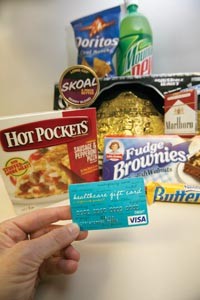If you've seen recent media reports about Pittsburgh-based health insurer Highmark's latest product, chances are you think the Healthcare Visa Gift Card truly is the gift of good health. After all, according to a Highmark press release, the gift card is meant to "cover out-of-pocket expenses related to personal health and wellness."
But judging from City Paper's experience shopping with the card, those expenses can include such health products as:
-- a pack of Marlboro cigarettes
-- a bag of Doritos
-- a box of sausage-and-pepperoni Hot Pockets
As it turns out, although givers of the card may have healthy intentions, recipients -- who ultimately determine how the card is used -- may not.
The first-of-its kind Healthcare Gift Card can be purchased in amounts ranging from $25 to $5,000, with additional shipping and handling costs extra. The card is advertised on its Web site, givewell.com, as "a gift of health." The site boasts, "The card can help pay for prescriptions and other healthcare products from a variety of stores," citing such purchases as gym memberships, prescription refills and dental care. But nowhere does it say that unhealthy items can be purchased from those retailers, too.
But CP used its $30 card -- which cost $36.20 when fees were added -- to make the following purchases: a pack of smokes, a Butterfinger, a bag of Doritos and fudge brownies from a Downtown CVS pharmacy; a two-liter bottle of Mountain Dew, a plastic World Wrestling Entertainment World Championship belt, and a box of sausage-and-pepperoni Hot Pockets from Target; and, finally, a tin of Skoal smokeless tobacco from Rite Aid.
"It's surprising you can buy cigarettes with a Healthcare Gift Card," City Paper observed to the CVS cashier as she tallied the cigarettes and junk food.
"Wow," she said, her mouth agape. "That shouldn't be. I thought it was just a regular card."
"I hope I don't get in trouble because of this."
She won't: If you want to buy unhealthy things, you can. Highmark would just prefer not to call too much attention to the fact.
"We haven't been shy about it in the press," says Kim Bellard, Highmark's vice president of e-marketing and consumer relations. "We don't make it a secret."
Indeed, in a Nov. 2 Pittsburgh Post-Gazette story headlined "Highmark offers the ultimate get-well card," Bellard was asked "couldn't you just take the gift card to Rite Aid and spend it on a case of Coca-Cola and a bag of Snickers bars?" Bellard answered yes, adding, "We obviously don't advertise that." And while a kid in college might spend a cash gift on beer, he noted, "[If y]ou give him a gift card, he's sort of got to cheat" to buy anything suspicious.
"We don't want to give people ideas about how to beat the system," Bellard tells CP. "We're trying to balance disclosure without discouraging people from buying the card."
"It's a blatant case of false advertising," says James Browning, director of PennPIRG, a Philadelphia-based nonprofit consumer-advocacy group. "It's pretty irresponsible, and it distorts the very meaning of the word 'health.'"
Aside from the health-related impact of the card, Browning says gift cards in general are "booby traps," since they can diminish in value if not used within a certain time period. According to the Healthcare Gift Card's Web site, nine months after the card is purchased, a maintenance fee of $1.50 is charged to the card.
"In a sense, it's worse than cash," Browning says.
Browning says Highmark should have waited until technology put restrictions on unhealthy purchases. "That would be a better way of doing it," because in the meantime, "Instead of helping someone out with their health, who knows what you're doing? Are you feeding their nicotine habit?"
According to Bellard, who says Highmark hopes to go national with the card, limiting the card to only healthy products is a "Visa/Mastercard issue," one that could take "a couple years to fix.
"The credit-card company is trying to put a product lock on it," he says. But the downside, he adds, is that such limits could be "more restrictive than what we want to do." Consumers might, for instance, lose their ability to buy gym memberships and other health services with the card.
There are some restrictions already in place. The card works only at designated retailers, so CP's attempt to purchase a bottle of Jim Beam at a Downtown liquor store proved unsuccessful.
And despite the loophole, Bellard says that both locally and nationally, "The card has gotten more publicity than we've ever anticipated." Although he says there are no reports on the card's sales yet, "We're very pleased with the response to date."
The only problem, according to Bellard, was meeting demand for the card in time for Christmas. While the Web site promised normal delivery in five to seven days, the card CP ordered on Dec. 7 didn't arrive until Dec. 22.
Still, that was just in time to help CP carry out its New Year's resolutions ... to consume more tobacco and junk food.


